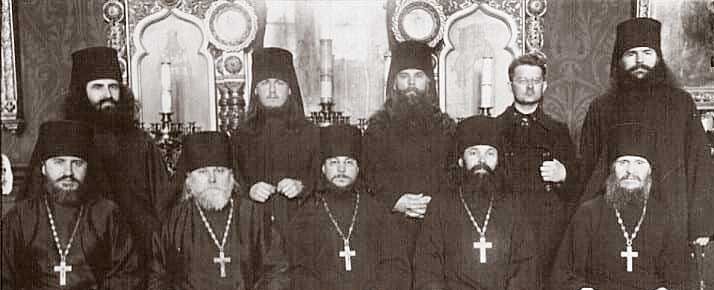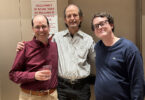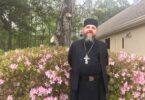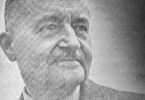История этого исследования и о том как можно помочь изданию научного труда к 2011 году. [Ввиду отсутствия нужных средств издание книги об Архиепископе Леонтии откладывается на неопредленное время.]
The Significance of this Project for the ROCOR
2011 will be the fortieth anniversary of the repose of Archbishop Leontii of Chile and Peru (1904-1971). The career of this hierarch presents an unusually revealing perspective on the ambiguities and controversies of the Russian Orthodox worldview. In Russia Father Leontii Leontii belognged to the jurisdiction of Metropolitan Sergii (Stragorodskii). Although he opposed Sergii’s compromises with Soviet regime, Father Leontii believed that his separation from Metropolitan Sergii would help Communist to “divide and rule” over the Orthodox Church.
Nevertheless, after Bishop Leontii left Russia in 1943, he joined the Russian Orthodox Church Outside of Russia and adopted the values of the Catacomb Church. In the 1960s Archbishop Leontii provided long-distance spiritual guidance to monk Lazarus (Zhurbenko), a member of the Catacomb Church in Russia. At the same time he maintained secret contacts with Archbishop Germogen (Golubev) of Moscow Patriarchate.
In 1962 despite the decree by the ROCOR’s Synod of Bishops prohibiting interference with the internal life of the Church of Greece, which had split from the Orthodox Church over the issue of the Gregorian calendar, Archbishop Leontii ordained bishops for the zealot movement in Greece that had separated from the Orthodox Church on the issue of the adoption of Gregorian calendar. Vladyka Leontii, notwithstanding the position of his superiors, was eager to help those Serbian emigrants who did not want to submit to a patriarch in communist Yugoslavia. Although Archbishop Leontii’s anticommunism merits further study, I can conclude preliminarily that while he considered Reds the epitome of evil, he ignored human rights abuses by the anticommunist dictatorships of Hitler, Perón and Stroessner.
The authenticity of Vladyka Leontii’s radicalism is seen in his opposition to the party of “diplomats” within the ROCOR’s episcopate. In the 1950s and 60s, Leontii actively opposed the dominant clerical party at ROCOR headquarters (the Synod) in New York. He supported the popular movement that demanded a more adequate representation of lay people in the supreme administration of the ROCOR. During conciliar meetings of the bishops, Vladyka Leontii refused to accept compromise verdicts on bishops who deviated from moral or canonical standards. Bishop Leontii’s stubbornness resulted in his being marooned in South America, whereas less eccentric church figures were being transferred from there to North America.
Although marginalized, Archbishop Leontii was a keen observer of Church history. His memoirs, which have never been published in their entirety, are a goldmine of information on prominent figures, largely due to his generous, extroverted personality and capacity for diverse and enduring friendships. The situation in Ukraine during World War II, when a bishop had to maneuver among Nazis, Ukrainian and communist partisans, is vividly reflected in documents and reminiscences related to Archbishop Leontii.
From the personal point of view, as a person of the faith, I find Archbishop Leontii’s career a compelling case study on the limits and ramifications of non-conformity. As an academic, I have found fascinating parallels in the politics of the Orthodox Church in Byzantium. For instance a scenario resembling the situation in Russia was played out in the ninth century moechian controversy when zealots (Studite monks) and diplomats (the patriarch and his Synod) disputed whether or not the Church’s toleration of the emperor’s offense against a moral standard was tantamount to apostasy.
For Russian readers, this study should fill in some critical gaps in their cultural legacy. A work of disinterested scholarship that challenges the various mythologies about Russian Orthodoxy is urgently needed in Russia at a time when the Orthodox Church has once again become a powerful social force. The fact that the position of zealots continues to shape the present identity of the Russian Orthodox Church can be seen in the document “Bases of the Social Concept of the Russian Orthodox Church” adopted in 2000: “III. 5. If the authority forces Orthodox believers to apostatize from Christ and His Church and to commit sinful and spiritually harmful actions, the Church should refuse to obey the state.”
My research covers Leontii’s entire career: persecution in the early USSR, German occupation, flight from Stalin’s regime, exile in South America. My hope is that this monograph will be a strong representation of the ROCOR scholarship in Russia. Now that the Russian Orthodox Church is united, publication in Russia of a monograph on Archbishop Leontii will signify that his protracted exile is over, and that he is finally returning to his homeland.
Outline of Archbishop Leontii of Chile: A Case Study in Russian Orthodox Non-Conformity
Introduction
I. In Russia:
A) Youth: Civil War, monasticism
B) 1920-1935: persecution, polemics, Church politics
II. In Ukraine under Nazi occupation.
III. In Exile (As an émigré):
A) Ministry for displaced persons in Germany
B) Meeting with Russian Diaspora
C) Argentina, Paraguay and Chile
D) Modern issues: Communism, ecumenism, Church reform, dictatorships.
E) Relations with the Synod in New York and with the lay movement.
Conclusion
Stages of the Project
The proposed monograph on Archbishop Leontii will significantly expand upon my earlier study, which was serialized in Pravoslavnaia Zhizn’ (March-May 1996). The coverage of Archbishop Leontii’s Ukrainian period in this work will be supplemented by new research on materials archived in Kiev. A colleague in Ukraine has undertaken on my behalf a series of interviews with Mikhail Karnaukh, a close associate of Leontii’s in the late 1930s. In Nanuet, New York, I have located Sergei Rymarenko, the son of Fr. Adrian, whom Fr. Leontii frequently visited. I have obtained oral histories from several people who knew Vladyka Leontii in Zhitomir while he was a bishop there during World War II.
In 1999 I undertook a field trip to Argentina, Paraguay and Chile. In Santiago I had a number of conversations with Fr. Veniamin (Vozniuk), who from 1943 to 1969 had been a monk under Leontii’s guidance, following him from Zhitomir to Santiago. In Buenos Aires I interviewed Prof. Igor Andruzkewicz, who served as secretary to Leontii. I established a correspondence with a former parishioner of Leontii in Lima; she provided me with a first-hand account of the controversy surrounding Leontii’s management of the parish. A number of aspects of my Pravoslavnaia Zhizn’ publication have to be corrected, and I must dispense with a more objective voice.[1]Unfortunately, the only English biography of Archbishop Leontii is, in many respects, quite inaccurate. It appeared in The Orthodox Word (Vol. 17, No. 4 /99/) July—August, 1981) and is republished … Continue reading
Many unique photos, including some of Archbishop Leontii’s family, have been recovered. I believe that I have gathered most of the pertinent data. I have yet to analyze the extensive correspondence with my various informants, in addition to recordings and other documents. I need to understand better the socio-historical context of Bishop Leontii’s work in Volynia during World War II and later in Chile. I am considering petitioning the Chilean Ministry of Internal Affairs for access to Archbishop Leontii’s file, and and I will check with the Old Calendarist Church of Greece to see if there is any documentation pertaining to the ordinations performed illicitly by Leontii in 1962.
In 2003 I got married, and since then I have had neither time nor funds to complete this project. Nonetheless, in order to solicit feedback on this project and to fundraise, I set up this Web site. With the help of this Web site I was able to obtain valuable information on Archbishop Leontii from Deacon Roberto, a cleric of the ROCOR parish in Santiago.
I cannot complete this project on my own. I need a grant that would allow me to focus on the Archbishop Leontii project and to prepare for publication his full-length biography. All expenses that I have incurred in the course of this research have come out of my very limited budget. His Eminence Metropolitan Hilarion gave me a blessing to facilitate fundraising for this project. Your help would allow me to focus on the preparation for publication of a full-length biography of Archbishop Leontii in conjunction with observances on the fortieth anniversary of Leontii’s death. You can donate either by regular mail or via PayPal on this site.[2]Since I have failed to raise any significant supporton my Archbishop Leontii book, I have decided to commit myself to other projects for the time being. Funds donated for the Leontii project (.00), … Continue reading
References
| ↵1 | Unfortunately, the only English biography of Archbishop Leontii is, in many respects, quite inaccurate. It appeared in The Orthodox Word (Vol. 17, No. 4 /99/) July—August, 1981) and is republished online at http://users.sisqtel.net/williams/archbishopleonty.html. |
|---|---|
| ↵2 | Since I have failed to raise any significant supporton my Archbishop Leontii book, I have decided to commit myself to other projects for the time being. Funds donated for the Leontii project (.00), unless otherwise instructed by the donors, will be applied toward maintenance of this Web site. |











